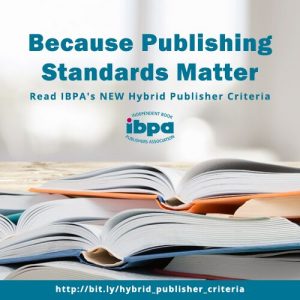PUBLISHED MARCH/APRIL 2018
by Angela Bole, CEO, Independent Book Publishers Association --

Angela Bole
Over the past several years, you might have heard the term “hybrid publisher” and wondered what made a hybrid publisher different from a self-publishing service provider; or, more pointedly, a “vanity press.” The IBPA Advocacy Committee, with support from the IBPA Board of Directors, wondered, as well, and when no one could find a definitive definition, the committee created and released on Feb. 20, 2018, a list of
nine criteria that define what it means to be a reputable hybrid publisher.
Here is what they discovered:
Hybrid publishing companies behave just like traditional publishing companies in all respects, except that they publish books using an author-subsidized business model, as opposed to financing all costs themselves, and in exchange return a higher-than-industry-standard share of sales proceeds to the author. In other words, a hybrid publisher makes income from a combination of publishing services and book sales.
Although hybrid publishing companies are author-subsidized, they are different from other author-subsidized models in that hybrid publishers adhere to a list of nine professional publishing criteria.
A hybrid publisher must:
- Define a mission and vision for its publishing program. A hybrid publisher has a publishing mission and a vision. In a traditional publishing company, the published work often reflects the interests and values of its publisher, whether that’s a passion for poetry or a specialization in business books. Good hybrid publishers are no different.
- Vet submissions. A hybrid publisher vets submissions, publishing only those titles that meet the mission and vision of the company, as well as a defined quality level set by the publisher. Good hybrid publishers don’t publish everything that comes over the transom and often decline to publish.
- Publish under its own imprint(s) and ISBNs. A hybrid publisher is a true publishing house, with either a publisher or a publishing team developing and distributing books using the hybrid publisher’s own imprint(s) and ISBNs.
- Publish to industry standards. A hybrid publisher accepts full responsibility for the quality of the titles it publishes. Books released by a hybrid publisher should be on par with traditionally published books in terms of adherence to industry standards, which are detailed in IBPA’s “Industry Standards Checklist for a Professionally Published Book.”
- Ensure editorial, design, and production quality. A hybrid publisher is responsible for producing books edited, designed, and produced to a professional degree. This includes assigning editors for developmental editing, copyediting, and proofreading, as needed, together with following traditional standards for a professionally designed book. All editors and designers must be publisher approved.
- Pursue and manage a range of publishing rights. A hybrid publisher normally publishes in both print and digital formats, as appropriate, and perhaps pursues other rights, in order to reach the widest possible readership. As with a traditional publisher, authors may negotiate to keep their subsidiary rights, such as foreign language, audio, and other derivative rights.
- Provide distribution services. A hybrid publisher has a strategic approach to distribution beyond simply making books available for purchase via online retailers. Depending on the hybrid publisher, this may mean traditional distribution, wherein a team of sales reps actively markets and sells books to retailers, or it may mean publisher outreach to a network of specialty retailers, clubs, or other niche-interest organizations. At minimum, a hybrid publisher develops, with the author, a marketing and sales strategy for each book it publishes, inclusive of appropriate sales channels for that book, and provides ongoing assistance to the author seeking to execute this strategy in order to get his or her book in front of its target audience. This is in addition to listing books with industry-recognized wholesalers.
- Demonstrate respectable sales. A hybrid publisher should have a record of producing several books that sell in respectable quantities for the book’s niche. This varies from niche to niche; small niches require sales of only a couple thousand copies, while mass-market books require more.
- Pay authors a higher-than-standard royalty. A hybrid publisher pays its authors more than the industry-standard royalty range on print and digital books, in exchange for the author’s personal investment. Although royalties are generally negotiable, the author’s share must be laid out transparently and must be commensurate with the author’s investment. In most cases, the author’s royalty should be greater than 50 percent of net on both print and digital books.

In comparing hybrid publishers with vanity presses, it’s important to note that vanity presses are not selective in what they publish, nor are they set up to be.
Therefore, it is better to think of vanity presses as self-publishing service providers, not publishers. In a self-publishing service provider/author relationship, it is the author who plays the publisher role. In a hybrid publisher/author relationship, it is the hybrid publisher that plays the publisher role.
Regardless of who pays for editorial, design, and production fees, it is always the publisher that bears responsibility for producing, distributing, and ultimately selling professional-quality books. An author-subsidized business model in no way relieves a publisher of its responsibilities. In other words, if you’re wearing the hat of “publisher,” professionalism matters.
Interested IBPA members can send questions and feedback to the IBPA Advocacy Committee by emailing
ibpa_advocacy@ibpa-online.org.
Just before Angela Bole became IBPA’s Chief Executive Officer, she was Deputy Executive Director of the Book Industry Study Group, Inc. (BISG), which fosters conversation and consensus across all sectors of the book business. Before that, Angela served for two years as BISG’s Associate Director and two years as its Marketing and Communications Manager.